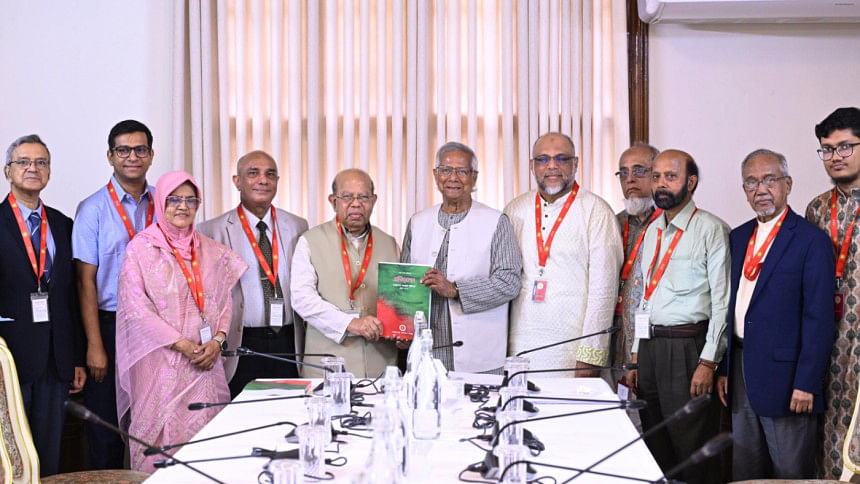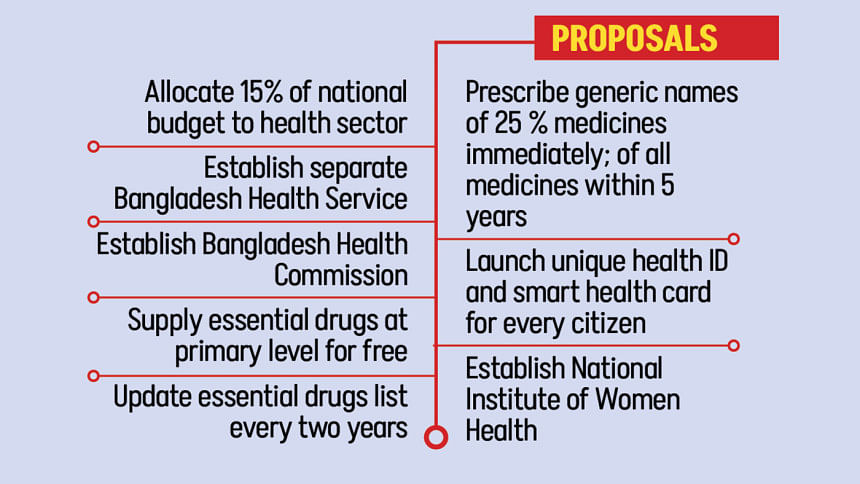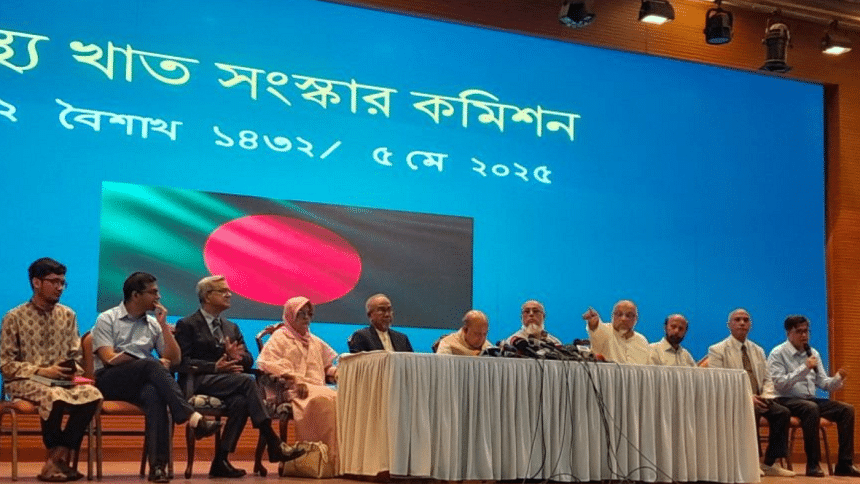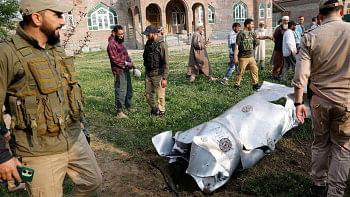Make primary healthcare free for everyone

The Health Sector Reform Commission has recommended that the government make primary healthcare its constitutional obligation and provide it free of cost to ensure universal access.
It also called for the formation of an independent and permanent Bangladesh Health Commission to formulate essential policies and strategies and to oversee the health sector.

The 12-member commission, led by National Professor AK Azad Khan, submitted its report to Chief Adviser Prof Muhammad Yunus at the State Guesthouse Jamuna yesterday.
The proposed reforms, the commission said, would take around two years to implement and should be carried out by a powerful inter-ministerial committee.
The submission comes at a time when the health sector faces major challenges, including inadequate funding, a shortage of health workers, high out-of-pocket expenses, unequal access to services, and weak governance.
These issues, health experts say, deprive many people of quality treatment and compel many others to seek medical care abroad.
Upon receiving the report, Prof Yunus instructed the relevant authorities to act on the immediately actionable recommendations, stating that they could play a crucial role in resolving the problems in the health sector, reports BSS.

The problems in the health sector are long-standing. If we can resolve these issues through this [the commission's report], it will be a groundbreaking move.
"The problems in the health sector are long-standing. If we can resolve these issues through this [the commission's report], it will be a groundbreaking move."
Noting the shortage of doctors as a major concern, he added that even where doctors are posted, they are sometimes unavailable when needed. "This problem should be resolved permanently."
Stressing the need for decentralisation, Yunus said, "Without it, the- problems cannot be solved. It must be ensured that doctors remain in their designated stations."
Following the fall of the Awami League government in the wake of a student-led uprising in August last year, the interim government formed more than a dozen reform commissions across various sectors.

The Health Sector Reform Commission, formed in November, was tasked with making recommendations to ensure health services are more people-oriented, accessible, and universal.
Members of the commission include Prof Mohammad Zakir Hossain, chairman of Community Clinic Health Assistance Trust; Prof Liaquat Ali, chairman of Pothikrit Foundation; Prof Sayeba Akhter, chairman of Bangladesh Medical Research Council; Prof Naila Zaman Khan, a paediatric neurologist; MM Reza, former health secretary; Prof M Muzaherul Huq, former regional adviser of World Health Organization for South-East Asia Region; Azharul Islam Khan, consultant of icddr'b; Prof Syed Md Akram Hussain, senior consultant of Square Cancer Centre of Square Hospital; Prof Syed Atiqul Haq, chief consultant of Green Life Center for Rheumatic Care and Research; Ahmed Ehsanur Rahman, a scientist at icddr,b; and Umayer Afif, a student of Dhaka Medical College.
Besides holding 51 regular meetings and 32 consultation meetings with stakeholders in Dhaka and other regions, it also visited hospitals over the past five and a half months to prepare the report. The Bangladesh Bureau of Statistics conducted a survey to assist the commission.
FURTHER RECOMMENDATIONS
After submitting the report yesterday, Prof AK Azad Khan and his team briefed reporters at the Foreign Service Academy.
"No matter how much we say 'health is my right', it currently has no legal mandate … Primary Health Care [PHC] will be a constitutional obligation for the government," said Prof AK Azad.
Accordingly, the commission recommended amending the constitution to enshrine PHC as a basic right.
The commission also said the structure of PHC must be strengthened by integrating union-level health and family planning centres and transforming them into primary healthcare centres.
In urban areas, such centres should be established under ward-level management. To this end, support from other relevant government and non-government sectors must be mobilised.
The commission further recommended establishing an autonomous Bangladesh Health Service by restructuring the current health cadre to promote professionalism, skills, and accountability -- modelled on the judicial service.
It also suggested forming a dedicated Public Service Commission to recruit healthcare professionals.
A separate secretariat led by a principal secretary, who would be a doctor, should be established to manage three divisions: clinical services, public health, and medical education.
To decentralise the system, the commission proposed establishing 11 regional health authorities at the divisional level.
It also recommended bringing several government agencies, including the Directorate General of Family Planning and the Health Economics Unit, under the Directorate General of Health Services (DGHS).
At present, two cadres -- health and family planning -- operate under the health ministry.
The commission proposed dissolving the family planning cadre, which includes both general and technical roles.
It called for merging the general cadre with the administration cadre, and the technical cadre with the health cadre, adding that field-level workers would come under the DGHS.
It proposed forming an independent and autonomous Bangladesh Health Commission to implement a "Health in All Policies" approach. The commission, comprising 17 wings, would ensure a transparent, accountable, and effective health system.
The commission recommended forming a high-level search committee for appointments to key positions, including the chief and deputy chiefs of the health commission; director generals of various directorates; vice chancellors, pro-vice chancellors and treasurers of medical universities; and principals of medical colleges.
The commission recommended allocating 15 percent of the national budget or five percent of the country's gross annual income to the health sector. It also called for the enactment of a special law to guarantee sufficient and sustained funding.
One percent of the national budget, it said, should be allocated for medical research.
Additionally, it called for exempting medicines for cancer, diabetes, hypertension, and certain antibiotics from taxes to lower their prices.
Any kind of attempt to influence doctors by pharmaceutical companies giving gifts or samples of medicines is prohibited, commission said.
It recommend that pharmaceutical companies inform doctors about their products through mail or post office, and that representatives should not be allowed to meet doctors directly for regular product promotion.
It also recommended establishing a network of pharmacies to distribute essential medicines either free of charge or at subsidised rates, while also updating the list of essential drugs every two years.
It suggested that doctors initially prescribe 25 percent of medicines using their generic names, with the goal of prescribing all medicines generically within five years.
The commission further recommended enacting at least 11 new laws and amending several existing ones to facilitate the reforms.
Additionally, it recommended establishing a National Institute of Women's Health to ensure appropriate treatment and care for women.
It proposed the creation of a structured referral system and, where necessary, mandatory referrals to ensure patients receive timely and appropriate care. This, the commission said, would help reduce overcrowding at tertiary-level health facilities.
The commission advised that health facilities run by government, autonomous, or semi-government bodies be kept free from politicisation. It further recommended that no individual directly involved in politics should hold executive positions in such institutions.
It also proposed introducing a non-practising allowance for full-time medical teachers, as well as special allowances and residential facilities for doctors serving in remote areas.
It recommended that all medical colleges and universities undergo regular evaluation in accordance with standards set by the World Federation for Medical Education. Additionally, it suggested reorganising educational institutions and restructuring seat capacities, even proposing the closure of substandard institutions if necessary.
To improve access and ease the burden on medical colleges and national institutes, the commission recommended establishing secondary- and tertiary-level hospitals in phases at the district level. It also proposed setting up regional referral hospitals at the divisional level.
The commission urged the development of a digital platform to handle complaints from service seekers and the formation of a medical police force to prevent violence at hospitals and clinics.
It also suggested introducing a unique health identity card and a smart health card for every citizen, enabling better health tracking and record management.
A separate pay structure should be devised for intern doctors, postgraduate medical students, non-government doctors, nurses, and other healthcare workers, the report added.
To reduce the number of patients seeking treatment abroad and to conserve foreign currency, the commission emphasised the need to establish centres of excellence for organ transplants, heart and kidney diseases, fertility treatments, and diagnostics, particularly through public-private partnerships.

 For all latest news, follow The Daily Star's Google News channel.
For all latest news, follow The Daily Star's Google News channel. 





Comments